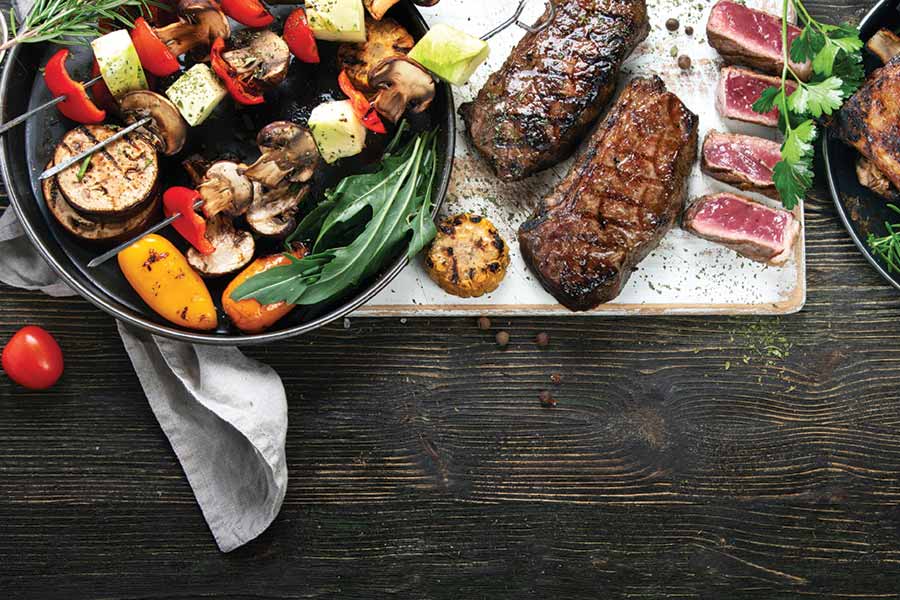How Fat Came to be Feared
By Jonathan Rimmel
With a broad reaching shout, the cry of “fat is bad” has filled our collective perception of health for the greater part of the twentieth century and remains into the start of the twenty-first. A plethora of groups, including many doctors, governments, popular media, and the food industry, have all touted the benefits of low-fat, high-carb diets. Carbohydrates were—and even now are—presented as heart-healthy and a staple of healthy living. Fruits and whole grains are still pushed, even among many of those declaring carbs are harmful. Certainly, you remember the food pyramid and now food plate. Even such organizations as the American Heart Association and American Dietetic Association continue to recommend them.
Fat makes you fat. Fat gives you heart disease. At first glance, this may seem like a logical, common-sense thing to accept. After all, if you eat fat, won’t you get fat? Fat is thick and gross, won’t it clog your arteries and give you a heart attack? Actually no, that’s not how human biology works, not at all. This “fat is bad” nonsense is not only a blatant lie, but a dangerous one. Let’s dive deeper into where this all came from, why it’s a problem, and how we fix it.
How did we get here?
This sort of thinking began as early as the 1940s, with some scientific studies showing correlations between high-fat diets and high-cholesterol levels. Doctors began recommending low-fat diets to the nation around the 1960s. By the 1980s, this ideology had permeated the government, media, and food industry. Many Americans jumped on board without question, for as I mentioned, it seemed on the surface to make sense. However, the proof of the pudding is in the eating (which you probably shouldn’t be eating, by the way) and an ever-increasing rise in disease—including various forms of dementia—and obesity accompanied the push for low-fat.
One especially influential and often cited study, which cemented the idea of low-fat, started with the hypothesis that saturated fat lead to high cholesterol and then to heart disease. Both of which have since been shown to have very little correlation. Ancel Benjamin Keys, an American physiologist, spearheaded the Seven Countries Study, officially beginning in the 1950s with a yearly $200,000 grant from the US Public Health Service. The Seven Countries Study took a look at numerous countries populations’ dietary habits and their relation to coronary heart-disease.
The published study presented in 1978 seemed to indicate there was a correlation between saturated fat intake and heart-disease. However, there were a few holes in the methodology behind the study. Firstly, the study began with the assumption that there would be an orderly relationship between fat intake and increased cases of coronary problems, creating a bias from the get go.
Secondly, the data presented was incomplete. Keys selected and eliminated counties based on a desired outcome. He disregarded countries that showed a high consumption of fat but low instances of heart-disease, or countries with low consumption of fat but high instances of heart-disease. France was not included in the study, and Greece was studied during Lent. Furthermore, Keys should have taken into account a larger number of factors, as correlation is not necessarily causation and to assume so can lead to wrong conclusions. The study completely ignored the effect of sugar consumption. Lastly, numerous colleagues and modern studies have refuted the Seven Countries Study’s results. For example, on August 1, 2017, True Health Initiative published a paper refuting the false ideas presented in the study. 2
Especially after this study, the idea of some fats—especially saturated fat (SFA)—being bad took hold. In light of this, the food industry began to push highly processed polyunsaturated vegetable oils as healthy alternatives. The problem is, polyunsaturated fat (PUFA) is unstable, and when exposed to heat and light it oxidizes and turns rancid. In fact, most vegetable oils are bad before you ever bring them home. What’s wrong with this? These oxidized vegetable oils cause inflammation. Inflammation is at the root of many health issues, including being the actual cause of heart-disease. Don’t take this as a reason to go extreme the other way and avoid PUFAs entirely however, we do need some of them as well, but from natural sources such as pork fat.
Why is this a concern?
To incorrectly point the finger at fat, especially saturated fat, and close your eyes to the real culprits of disease can only lead to a false sense of security. Meanwhile, people continue to suffer from diabetes, heart-disease, dementia, and may other diet related conditions.
One primary argument, which permeates every study indicating the dangers of fat, is its role in atherosclerosis, which is the clogging of arteries. This starts with yet another assumption, that a rise in cholesterol is cause for concern and an indicator of increased heart-disease risk. However, this assumption is misguided. Firstly, what people commonly refer to as cholesterol isn’t actually cholesterol. Second, there are multiple components at play, only one of which presents any cause for concern. Though the details are too complex to get into here.
The low-fat mantra also led to a strong rise in not just wheat consumption but also sugar, the true culprits in the obesity epidemic. How do ranchers make fat cows? Feed them grains.
Ok, so fat doesn’t make you fat, but what about excess calories? If you take in more calories than you burn, the excess is stored as fat. Doesn’t fat have more calories than protein or carbohydrates? Yes, fat has about twice the caloric density of carbs. However, the difference is in satiation. Have you ever had a meal high in carbohydrates, and been hungry an hour later? Fat doesn’t work that way. Fat is satiating. Eating a healthy, fat-centric diet actually makes it quite difficult to overeat. Why do you think so many body builders eat a lot of pasta and other carb-heavy foods?
Illustrating this point further, ponder what it would be like, living in the wild just trying to survive. What would you eat? Would you grab a bowl of cereal? Of course, you wouldn’t. Perhaps you’d spend all your days cultivating wheat to make some bread. No. You’d be eating meat, animal fat, and possibly some vegetables, because they’re optimal for your survival, and readily available. Our bodies have not adapted to a diet of pizza and donuts. Humans thrive on the nutrient-packed real foods found in nature.
Are there any problems eating fat?
There is still an inherent danger here, one that proponents of low-fat would gladly point out. Going low-carb can be a slippery slope if you treat it the same way many have treated low-fat. Low-carb and low-fat both can lead to people following the marketing buzzwords and grabbing anything off the shelf making those claims. Rarely are those factory produced items healthy. Just as low-fat items are often full of sugar and artificial ingredients, low-carb items can contain sugar-substitutes and a host of other toxic substances. I can’t tell you how many times I’ve grabbed a “keto” product off the shelf only to see it was anything but.
What should we do?
It’s not about low this and low that, bad this, good that. It isn’t about calories, either. We want to shift this very limited one-dimensional thinking. Focus on the quality and composition of what you’re eating. What you eat with fat and the kind of fat makes a difference. An optimal diet will have the majority of your calories coming from fat.
Stop gravitating towards trends of the day and fad diets. Don’t think of going on a diet, or any going after any other temporary quick-fix solution. They don’t work. Instead, focus on eating real food produced by nature, not fake foods made by humans. Change your whole lifestyle and mindset. Then you can achieve genuine wellness. MSN
1 www.sevencountriesstudy.com/about-the-study/history
2 Pett, Kahn, Willett, Katz (2017). “Ancel Keys and the Seven Countries Study: An Evidence-based Response to Revisionist Histories” (PDF). True Health Initiative. Retrieved August 29, 2018. www.truehealthinitiative.org/wp-content/uploads/2017/07/SCS-White-Paper.THI_.8-1-17.pdf










